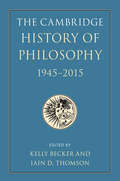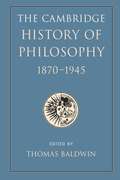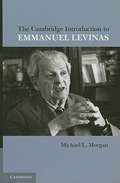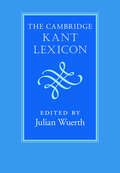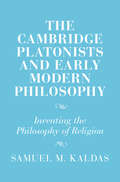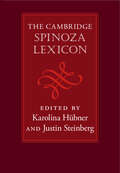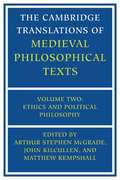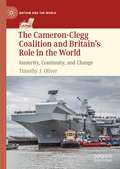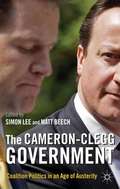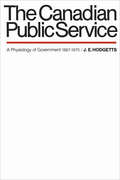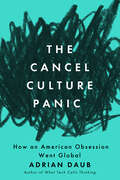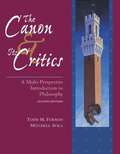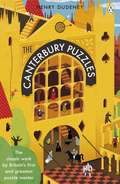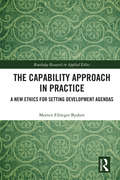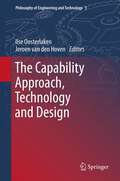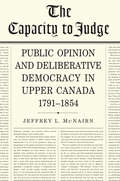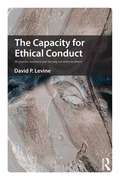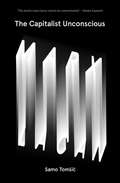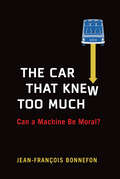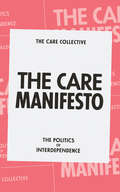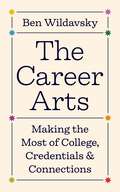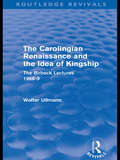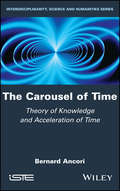- Table View
- List View
The Cambridge History of Philosophy, 1945–2015
by Iain D. Thomson Kelly BeckerThis landmark achievement in philosophical scholarship brings together leading experts from the diverse traditions of Western philosophy in a common quest to illuminate and explain the most important philosophical developments since the Second World War. Focusing particularly (but not exclusively) on those insights and movements that most profoundly shaped the English-speaking philosophical world, this volume bridges the traditional divide between 'analytic' and 'Continental' philosophy while also reaching beyond it. The result is an authoritative guide to the most important advances and transformations that shaped philosophy during this tumultuous and fascinating period of history, developments that continue to shape the field today. It will be of interest to students and scholars of contemporary philosophy of all levels and will prove indispensable for any serious philosophical collection.
The Cambridge History of Philosophy: 1870-1945
by Thomas BaldwinComprising over sixty specially commissioned essays by experts on the philosophy of this period, this anthology is designed to be accessible to non-specialists. The first part traces the history of philosophy from its remarkable flowering in the 1870s through to the early years of the twentieth century. After a brief discussion of the First World War's impact, the second part describes further developments during the first half of the twentieth century.
The Cambridge History of Postmodern Literature
by Brian Mchale Len Platt McHale, Brian and Platt, LenThe Cambridge History of Postmodern Literature offers a comprehensive survey of the field, from its emergence in the mid-twentieth century to the present day. It offers an unparalleled examination of all facets of postmodern writing that helps readers to understand how fiction and poetry, literary criticism, feminist theory, mass media, and the visual and fine arts have characterized the historical development of postmodernism. Covering subjects from the Cold War and countercultures to the Latin American Boom and magic realism, this History traces the genealogy of a literary tradition while remaining grounded in current scholarship. It also presents new critical approaches to postmodern literature that will serve the needs of students and specialists alike. Written by a host of leading scholars, this History will not only engage readers in contemporary debates but also serve as a definitive reference for years to come.
The Cambridge Introduction to Emmanuel Levinas
by Michael L. MorganThis book provides a clear and helpful overview of the thought of Emmanuel Levinas, one of the most significant and interesting philosophers of the late twentieth century. Michael L. Morgan presents an overall interpretation of Levinas's central principle that human existence is fundamentally ethical and that its ethical character is grounded in our face-to-face relationships. He explores the religious, cultural and political implications of this insight for modern Western culture and how it relates to our conception of selfhood and what it is to be a person, our understanding of the ground of moral values, our experience of time and the meaning of history, and our experience of religious concepts and discourse. Includes an annotated list of recommended readings and a selected bibliography of books by and about Levinas. An excellent introduction to Levinas for readers unfamiliar with his work, and even for those without a background in philosophy.
The Cambridge Kant Lexicon
by Julian WuerthImmanuel Kant is widely recognized as one of the most important Western philosophers since Aristotle. His thought has had, and continues to have, a profound effect on every branch of philosophy, including ethics, metaphysics, epistemology, aesthetics, political philosophy, and philosophy of religion. This Lexicon contains detailed and original entries by 130 leading Kant scholars, covering Kant's most important concepts as well as each of his writings. Part I covers Kant's notoriously difficult philosophical concepts, providing entries on these individual 'trees' of Kant's philosophical system. Part II, by contrast, provides an overview of the 'forest' of Kant's philosophy, with entries on each of his published works and on each of his sets of lectures and personal reflections. This part is arranged chronologically, revealing not only the broad sweep of Kant's thought but also its development over time. Professors, graduate students, and undergraduates will value this landmark volume.
The Cambridge Platonists and Early Modern Philosophy: Inventing the Philosophy of Religion (Cambridge Studies in Religion and Platonism)
by Samuel M. KaldasOften neglected by historians today, the seventeenth-century philosophers known as the Cambridge Platonists were recognised in their time as some of the most influential and controversial philosophers in England. Whereas most studies of the Cambridge Platonists have discussed their later careers, this book focuses on their early, formative years at Cambridge during the English Civil Wars. Samuel M. Kaldas explores how the Cambridge Platonists addressed issues central to philosophy of religion as we know it today through their engagement with early seventeenth-century religious controversies about predestination, the character and nature of God, and the role of reason in religion. His study serves as an accessible introduction to both the Cambridge Platonists, and to English religious controversies that contributed to the birth of the modern philosophy of religion. At the same time, Kaldas provides context for and fresh insights into the Cambridge Platonists' intellectual development and the coherence of their thought.
The Cambridge Rawls Lexicon
by Jon Mandle David A. ReidyJohn Rawls is widely regarded as one of the most influential philosophers of the twentieth century, and his work has permanently shaped the nature and terms of moral and political philosophy, deploying a robust and specialized vocabulary that reaches beyond philosophy to political science, economics, sociology, and law. This volume is a complete and accessible guide to Rawls' vocabulary, with over 200 alphabetical encyclopaedic entries written by the world's leading Rawls scholars. From 'basic structure' to 'burdened society', from 'Sidgwick' to 'strains of commitment', and from 'Nash point' to 'natural duties', the volume covers the entirety of Rawls' central ideas and terminology, with illuminating detail and careful cross-referencing. It will be an essential resource for students and scholars of Rawls, as well as for other readers in political philosophy, ethics, political science, sociology, international relations and law.
The Cambridge Spinoza Lexicon
by Justin Steinberg Karolina HübnerBaruch Spinoza is one of the most important and original thinkers of the modern period. His work inspired religious free-thinkers and political radicals, French Enlightenment philosophes, German Idealists, Russian Marxists, writers, and scientists. The Lexicon is a comprehensive compendium of entries on Spinoza's own concepts and associated historical figures. It cuts through the daunting profusion of Spinoza scholarship by supplying compact entries that contextualize Spinoza's thought, elucidate crucial concepts, and point the way to the relevant scholarly debates and studies. With entries by established and emerging scholars from North America, Australasia, and Europe, this is not only the most comprehensive and up-to-date picture of Spinoza scholarship, but also the most international and most diverse. It is a vital resource for novices and experts alike seeking to expand their knowledge of Spinoza.
The Cambridge Translations of Medieval Philosophical Texts: Volume II Ethics and Political Philosophy
by Arthur Stephen Mcgrade John Kilcullen Matthew KempshallThe eagerly-awaited second volume of The Cambridge Translations of Medieval Philosophical Texts will allow scholars and students access for the first time in English to major texts in ethics and political thought from one of the most fruitful periods of speculation and analysis in the history of western thought. Beginning with Albert the Great, who introduced the Latin west to the challenging moral philosophy and natural science of Aristotle, and concluding with the first substantial presentation in English of the revolutionary ideas on property and political power of John Wyclif, the seventeen texts in this anthology offer late medieval treatments of fundamental issues in human conduct that are both conceptually subtle and of direct practical import. Special features of this volume include copious editorial introductions, an analytical index, and suggestions for further reading. This is an important resource for scholars and students of medieval philosophy, history, political science, theology and literature.
The Cameron-Clegg Coalition and Britain’s Role in the World: Austerity, Continuity, and Change (Britain and the World)
by Timothy J. OliverThis is the first in-depth study of the foreign and defence policies of the Coalition, a government that saw the Conservatives restored to power for the first time since the Iraq War and the Liberal Democrats enter government for the first time. It explores the idea of Britain as a ‘Great Power’ since 1945 to show how the Coalition’s policies fitted into wider historical understandings of Britain’s role in the world. Drawing on a range of evidence from the time of the Coalition, it shows that this period was one of continued change in British foreign policy. The Coalition conducted the first strategic defence review since 1998, significantly reduced the funding allocations for defence and foreign affairs, raised overseas aid spending to record levels, engaged in overseas military action in two sovereign states (and were denied a chance to participate in another), as well as a wide array of other policies. This book argues that evaluating these events and the historical background of the Coalition is critical to understanding the current crises gripping British politics.
The Cameron–Clegg Government
by Simon Lee Matt BeechBeech and Lee provide a definitive guide to the coalition's first year in office. Offering compelling insights into their policy agenda, its chances of success, and a thought-provoking analysis of how the coalition government will affect the Conservatives, Liberal Democrats and Labour long-term.
The Canadian Public Service: A Physiology of Government 1867-1970
by John HodgettsThe Canadian Public Service is now so large that it employs over ten per cent of Canada's labour force, and among its many boards, commissions, and corporations there is a constant juggling of conventional departmental portfolios in an effort to keep pace with changing public priorities. As these bureaucracies penetrate our lives more and more, there is increasing need for a study which describes and explains them. This book is the first to offer the necessary clarification. It says nothing about public servants themselves; rather it focuses on the physiognomy and physiology of the structures in which they work and through which programmes are allocated, work distributed, and policy decisions made for all of Canada. It also examines the way in which environmental forces have helped to shape our so-called administrative culture, as well as the monumental difficulties that are involved in co-ordinating the administration of this vast country, three-quarters of whose public service concerns are located outside the capital. It concludes that all of our public organizations, the public service has proven the most responsive to the forces of change, but that it has been so caught up in structural and managerial adaptation that its capacity to concern itself with substantive policy issues has been subverted.
The Cancel Culture Panic: How an American Obsession Went Global
by Adrian DaubFear of cancel culture has gripped the world, and it turns out to be an old fear in a new get-up. In this incisive new work, Adrian Daub analyzes the global spread of cancel culture discourse as a moral panic, showing that, though its object is fuzzy, talk of cancel culture in global media has become a preoccupation of an embattled liberalism. There are plenty of conservative voices who gin up worries about cancel culture to advance their agendas. But more remarkable perhaps is that it is centrist, even left-leaning, media that have taken up the rallying cry and really defined the outlines of what cancel culture is supposed to be. Media in Western Europe, South America, Russia, and Australia have devoted as much—in some cases more—attention to this supposedly American phenomenon than most US outlets. From French crusades against "le wokisme" via British fables of the "loony left" to a German obsession with campus anecdotes to a global revolt against "gender studies": countries the world over have developed culture war narratives in conflict with the US, and, above all, its universities—narratives that they themselves borrowed from the US. Who exactly is afraid of cancel culture? To trace how various global publics have been so quickly convinced that cancel culture exists and that it poses an existential problem, Daub compares the cancel culture panic to moral panics past, investigating the powerful hold that the idea of "being cancelled" has on readers around the world. A book for anyone wondering how institutions of higher learning in the US have become objects of immense interest and political lightning rods; not just for audiences and voters in the US, but worldwide.
The Canon And Its Critics: A Multi-Perspective Introduction to Philosophy
by Todd M. Furman Mitchell AvilaIn our experience, philosophical discourse in the past two decades has been marked by unprecedented vibrant energy, vigorous debate, and engaging new developments. Whether the result of ongoing developments within the traditional confines of academic philosophy, or the consequence of critiques and challenges by individuals formerly marginalized from mainstream philosophy, or the fruit of cross-fertilization from interdisciplinary ventures, philosophers have witnessed unparalleled advances resulting in the production of interesting new philosophies. In the past decade, a very different picture of the boundaries and frontiers of philosophy has emerged. A new textbook was necessary in order to respond to these changes.
The Canterbury Puzzles
by Henry DudeneyFor the mastermind who has what it takes to solve the tricky conundrums from Britain's first and greatest puzzle master.---------------------------------------Solve the puzzle of The Mystery of Ravensdene Park . . . trace the route of the butler, the gamekeeper and the two anonymous guests and the key to the mystery will reveal itself.---------------------------------------Decipher the riddle of The Frogs' Ring for The Merry Monks of Riddlewell . . . ---------------------------------------At The Squire's Christmas Puzzle Party ascertain just how many kisses had been given Under the Mistletoe Bough . . . ---------------------------------------First published in 1907, Dudeney's The Canterbury Puzzles is a classic of the genre, based on characters from Chaucer's Tales. The book contains 114 puzzles suitable for young enthusiasts, recreational mathematicians and veteran puzzlers alike. As challenging today as it was over a century ago, this ingenious book will provide hours-worth of puzzles to keep your brain alert."Regular exercise is supposed to be as necessary for the brain as for the body. Many of us are very apt to suffer from mental cobwebs, and there is nothing equal to the solving of puzzles for sweeping them away." - Henry Dudeney (1847-1930)
The Capability Approach in Practice: A New Ethics in Setting Development Agendas (Routledge Research in Applied Ethics)
by Morten Fibieger ByskovThis book develops a philosophical framework for selecting goals for development purposes. This inclusive and democratic framework integrates a variety of resources including philosophical theory, empirical analysis, stakeholder deliberations, local knowledge, and advice from development experts. The author contends that we must provide good reasons and arguments in order to justify a particular development agenda. That is, we need to ask why we choose certain kinds of development goals over others, why we include certain agents in the selection process and not others, and why we select goals through one method rather than another. In response to these questions, the author argues that development should aim at expanding people’s capabilities and functionings. Capabilities and functionings—capabilities that have been realized—tell us what people are actually able to do and be with their resources, goods, and formal freedoms. He advances the view that local stakeholders should have more authority in deciding what a development agenda looks like. This claim to local authority in development can be interpreted both as a claim to political authority and expert authority. Finally, the author argues that ad hoc, foundational, procedural, and mixed (multi-stage) methods need to be synthesized in order to select the best capabilities and functionings for development. The Capability Approach in Practice provides a philosophical and systematic approach to setting development agendas. It is an important contribution to the literature on the capability approach and development ethics, which will appeal to a broad range of scholars within philosophy and development studies.
The Capability Approach, Technology and Design
by Jeroen Van Hoven Ilse OosterlakenThe capability approach of Martha Nussbaum and Amartya Sen places human capabilities at the centre stage of discussions about justice, equality, development and the quality of life. It rejects too much emphasis on mere preference satisfaction or resource provision and highlights the importance of human agency and freedom. This approach has already significantly influenced different fields of application, such as economics and development studies. Only recently have scholars started to explore its relevance for and application to the area of technology and design, which can be crucial factors in the expansion of human capabilities. How does technology influence human capabilities? What difference could a capability approach make to policies and practices of applying ICT in development processes in the South? How can we criticize and improve the design of technology from the perspective of the capability approach? The authors of this volume explore the implications of the capability approach for technology & design and together create the first volume on this emerging topic.
The Capacity To Judge: Public Opinion and Deliberative Democracy in Upper Canada,1791-1854
by Jeffrey McnairnBy the mid-nineteenth-century, 'public opinion' emerged as a new form of authority in Upper Canada. Contemporaries came to believe that the best answer to common questions arose from deliberation among private individuals. Older conceptions of government, sociability and the relationship between knowledge and power were jettisoned for a new image of Upper Canada as a deliberative democracy. The Capacity to Judge asks what made widespread public debate about common issues possible; why it came to be seen as desirable, even essential; and how it was integrated into Upper Canada's constitutional and social self-image. Drawing on an international body of literature indebted to Jürgen Habermas and based on extensive research in period newspapers, Jeffrey L. McNairn argues that voluntary associations and the press created a reading public capable of reasoning on matters of state, and that the dynamics of political conflict invested that public with final authority. He traces how contemporaries grappled with the consequences as they scrutinized parliamentary, republican and radical options for institutionalizing public opinion. The Capacity to Judge concludes with a case study of deliberative democracy in action that serves as a sustained defense of the type of intellectual history the book as a whole exemplifies.
The Capacity for Ethical Conduct: On psychic existence and the way we relate to others
by David P. LevineWhat is the root cause of ethical failure? Why is preoccupation with ethics more a part of the problem than a part of the solution? What makes ethical conduct a natural expression of who we are? What enables us to be ourselves in our relations with others? Ethical failure has become a significant concern in public life, in organizations and in educational institutions. The Capacity for Ethical Conduct explores how qualities of character and personality either make ethical conduct possible for the individual or foster ethical failure. David Levine discusses how ethical conduct is a special way of relating to others, one that secures respect for their integrity by assuring that what they do can express who they are. He argues that this special way of relating to others results not from knowledge of, or a stated commitment to, rules, norms and values, but from the way we experience ourselves, especially from our ability to make a positive emotional investment in being and having a self. Traditionally, emphasis on the importance of values and ethics in shaping conduct tends to be connected to the need to find fault in self and others, fostering an atmosphere where the self is put at risk in its relations to others. This means that an excessive emphasis on ethics, rather than assuring ethical conduct, tends instead to create interpersonal settings marked by emotional assault. Because of this, talk about ethics often expresses ambivalence about ethical conduct, which makes the familiar combination of preoccupation with ethics and ethical failure unsurprising. The Capacity for Ethical Conduct explores the ways in which the interpersonal world of work either fosters a feeling of safety or encourages various forms of emotional assault. Presenting case studes and applying psychoanalytic object relation theory and self psychology, this book explores the factors underlying ethical failure and the capacity for ethical conduct. It will be of interest to scholars and practioners in the fields of psychoanalysis, psychology, philosophy, sociology, organizational dynamics, management and public administration.
The Capitalist Unconscious
by Samo TomsicA major systematic study of the connection between Marx and Lacan's workDespite a resurgence of interest in Lacanian psychoanalysis, particularly in terms of the light it casts on capitalist ideology--as witnessed by the work of Slavoj i ek--there remain remarkably few systematic accounts of the role of Marx in Lacan's work. A major, comprehensive study of the connection between their work, The Capitalist Unconscious resituates Marx in the broader context of Lacan's teaching and insists on the capacity of psychoanalysis to reaffirm dialectical and materialist thought. Lacan's unorthodox reading of Marx refigured such crucial concepts as alienation, jouissance and the Freudian 'labour theory of the unconscious'. Tracing these developments, Tomšič maintains that psychoanalysis, structuralism and the critique of political economy participate in the same movement of thought; his book shows how to follow this movement through to some of its most important conclusions.From the Trade Paperback edition.
The Car That Knew Too Much: Can a Machine Be Moral?
by Jean-Francois BonnefonThe inside story of the groundbreaking experiment that captured what people think about the life-and-death dilemmas posed by driverless cars.Human drivers don't find themselves facing such moral dilemmas as "should I sacrifice myself by driving off a cliff if that could save the life of a little girl on the road?" Human brains aren't fast enough to make that kind of calculation; the car is over the cliff in a nanosecond. A self-driving car, on the other hand, can compute fast enough to make such a decision--to do whatever humans have programmed it to do. But what should that be? This book investigates how people want driverless cars to decide matters of life and death. In The Car That Knew Too Much, psychologist Jean-François Bonnefon reports on a groundbreaking experiment that captured what people think cars should do in situations where not everyone can be saved. Sacrifice the passengers for pedestrians? Save children rather than adults? Kill one person so many can live? Bonnefon and his collaborators Iyad Rahwan and Azim Shariff designed the largest experiment in moral psychology ever: the Moral Machine, an interactive website that has allowed people --eventually, millions of them, from 233 countries and territories--to make choices within detailed accident scenarios. Bonnefon discusses the responses (reporting, among other things, that babies, children, and pregnant women were most likely to be saved), the media frenzy over news of the experiment, and scholarly responses to it. Boosters for driverless cars argue that they will be in fewer accidents than human-driven cars. It's up to humans to decide how many fatal accidents we will allow these cars to have.
The Care Manifesto: The Politics of Interdependence
by The Care CollectiveWe are in the midst of a global crisis of care. How do we get out of it?The Care Manifesto puts care at the heart of the debates of our current crisis: from intimate care--childcare, healthcare, elder care--to care for the natural world. We live in a world where carelessness reigns, but it does not have to be this way.The Care Manifesto puts forth a vision for a truly caring world. The authors want to reimagine the role of care in our everyday lives, making it the organising principle in every dimension and at every scale of life. We are all dependent on each other, and only by nurturing these interdependencies can we cultivate a world in which each and every one of us can not only live but thrive.The Care Manifesto demands that we must put care at the heart of the state and the economy. A caring government must promote collective joy, not the satisfaction of individual desire. This means the transformation of how we organise work through co-operatives, localism and nationalisation. It proposes the expansion of our understanding of kinship for a more 'promiscuous care'. It calls for caring places through the reclamation of public space, to make a more convivial city. It sets out an agenda for the environment, most urgent of all, putting care at the centre of our relationship to the natural world.
The Career Arts: Making the Most of College, Credentials, and Connections
by Ben WildavskyA persuasive case for building career success through broad education, targeted skills, and social capitalYoung people coming out of high school today can expect to hold many jobs over the course of their lives, which is why they need a range of essential skills. The Career Arts provides a corrective to the widespread and misleading notion that there is a direct trade-off between going to college and acquiring practical job skills. Ben Wildavsky cuts through the noise and anxiety surrounding this issue to offer sensible, clear-eyed guidance for anyone who is making decisions about education and career preparation with a view to getting ahead in the workforce.Drawing on evidence-based research, illuminating case studies, and in-depth interviews, Wildavsky shares the most vital lessons of what he calls the career arts, which include cultivating a mix of broad and targeted skills, taking advantage of employer-funded education benefits, and preparing for the world as it is, not as you wish it could be. He explains why college remains the gold standard of credentials, and presents the most promising high-quality supplements and alternatives to college that can help learners combine general and job-specific skills. He shows how building social capital is also critical to success, particularly for disadvantaged students.An invaluable guidebook for students, parents, counselors, and educators, The Career Arts reveals why college education and job preparation are not either-or propositions and identifies the blend of education and networking needed to support real-world career aspirations.
The Carolingian Renaissance and the Idea of Kingship: The Birkbeck Lectures, 1968-9 (Routledge Revivals: Walter Ullmann on Medieval Political Theory)
by Walter UllmannIn his Birkbeck Lectures, first published in 1969, Professor Ullmann throws new light on a familiar subject. He shows that the Carolingian renaissance had a wider and deeper meaning than has often been thought, especially in its political and ideological aspects. Displaying his mastery of both primary and secondary sources, Professor Ullmann presents an integrated history. He shows an epoch which holds a key to the better understanding not only of the subsequent medieval centuries, but also of modern Europe. This book opened new vistas in political, ideological and social history as well as in historical theology and jurisprudence and showed how relevant knowledge of the past is for the understanding of the present.
The Carousel of Time: Theory of Knowledge and Acceleration of Time
by Bernard AncoriBased around the image of a carousel, this book uses epistemological theory to tackle the paradoxical acceleration and deceleration of time that is experienced by many. The consequence of this paradox is the observance of the past, present and future coinciding, where acceleration is combined with perfect immobility. The Carousel of Time proposes a model that focuses on a complex network of individual actors, and their relation to the analysis, structure and evolution of our socio-cognitive space–time. The first part of the book, "Foundations", presents the key bases of this model, as well as the notions that must be understood and integrated. The book then analyzes the concept of "Space", defining the parameters of the network’s boundaries, and finishes with an exploration of "Time". This third part links the temporality of the network to its spatial characteristics and studies its evolution.
